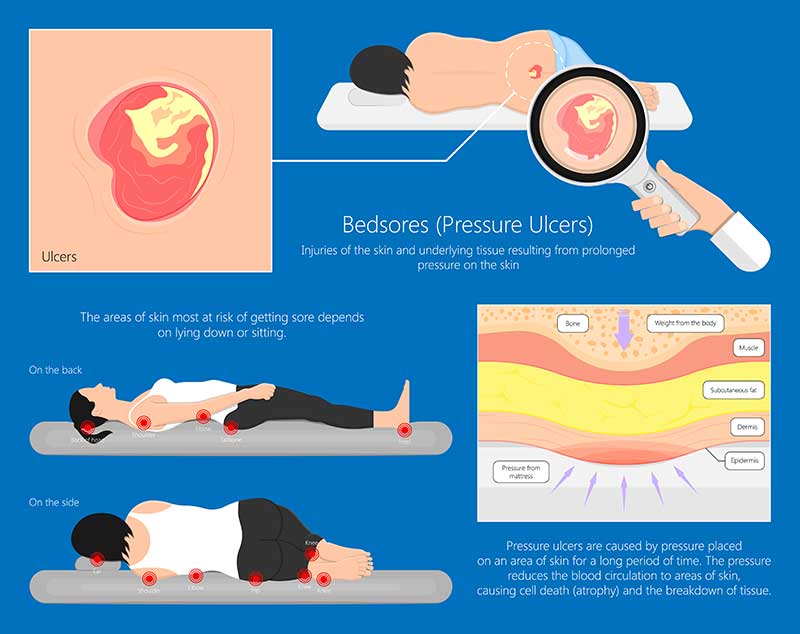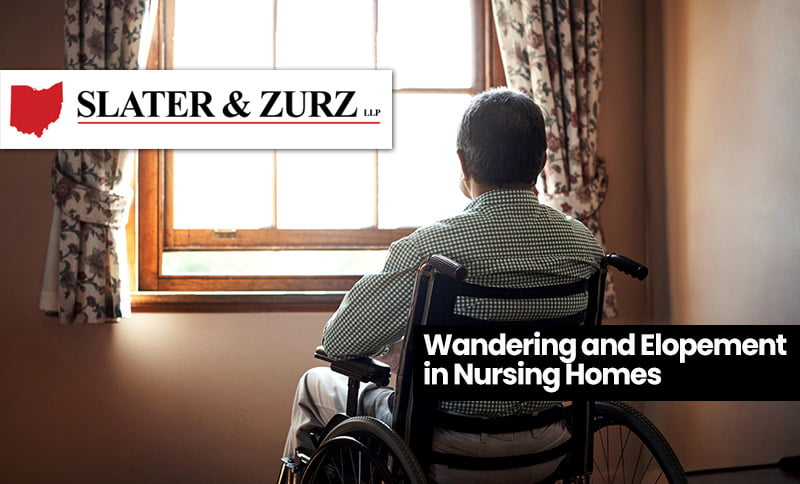Bedsores are serious and painful wounds that are common among nursing home residents and other adults with limited mobility. In fact, the Centers for Disease Control (CDC) estimates that nearly 1 million Americans suffer the effects of bedsores each year. Though, sadly, these wounds are highly avoidable with only basic preventative measures.
In this article, we discuss the causes and stages of bedsores, what can happen if they aren’t adequately treated, and how to prevent them. We also explain what to do if you or a loved one develops a bedsore while residing in a nursing home or other residential care facility and when and how to take legal action.
To learn more about your legal options following a bedsore injury or other form of nursing home abuse or neglect, turn to Slater & Zurz. Our team of experienced nursing home abuse lawyers will lead in the fight for justice. Nursing home abuse and neglect is perhaps the most despicable wrongdoing. Our highly-respected Ohio nursing home abuse and neglect lawyers will fight tooth and nail to hold those responsible for the neglect accountable for their actions. When you need dedicated, trustworthy, and relentless legal representation, turn to Slater & Zurz.
Call (888) 534-4850 today to discuss your legal options with an Ohio nursing home abuse lawyer.
What Causes Bed Sores
Also referred to as “pressure sores,” bedsores occur when a person lies or sits in one position for an extended period of time. The weight of their body against the surface eventually cuts off the blood supply to the area, causing a wound.
Bedsores are especially common for those who are confined to a bed or wheelchair, either from illness, disability, or injury. Because these injuries are highly preventable when an individual is regularly repositioned, they are viewed as a strong indicator of nursing home abuse and neglect.
The Four Stages of Bedsores
Medical professionals classify pressure ulcers into four stages, with stage 1 pressure sores being the mildest and stage 4 being the most severe – even life-threatening. According to Johns Hopkins Medicine, the four stages are as follows:
Stage 1 – In the first stage, the affected area will appear red, blue, or purple and feel warm to the touch. It may also feel either firmer or softer than the surrounding tissue. The individual may experience itching, pain, or a burning sensation. A good indicator of a stage 1 bedsore is that the area does not get lighter when you press on it. Stage 1 may heal in as little as two or three days.
Stage 2 – During the second stage, the damage goes into the deeper layers of skin. The skin has a scrape, sore, or blister and may ooze a clear fluid or pus. The pain is more severe with a stage 2 pressure ulcer, and the area is red, warm, and swollen. Stage 2 bedsores can take anywhere from three days to a few weeks to heal.
Stage 3 – In stage 3, the wound has gone through all skin layers, reaching the fat tissue. The sore resembles a crater and may have a foul odor. It may also have red edges, pus, drainage, and feel warm to the touch, which are all signs of infections. If the interior of the wound is black, the skin has died. Stage 3 pressure ulcers generally need medical attention but can still take between one month to four months to heal.
Stage 4 – In the fourth most severe stage, the wound can reach your muscles and ligaments. The sore covers a large area and is deep. The skin will appear black and likely show signs of infection, such as red edges, pus, odor, and drainage, and feel hot to the touch. You may also be able to see muscles, tendons, and bones. Stage 4 pressure ulcers need to be treated by a doctor immediately. According to the NIH, stage 4 pressure sores can take anywhere from three months to several years to fully heal and can cost upwards of $125,000.
Who is Most Susceptible to Developing Bed Sores?
Although anyone can develop a pressure ulcer, the following can make someone more likely to form these painful wounds:
- Older adults with mobility issues
- Individuals with weakened skin or who are more susceptible to injury
- The inability to sense pain
- Those who are unconscious
- Being confined to a bed or wheelchair
- Paralysis, or the inability to move some or all of the body
- Individuals with either low body weight or obesity
- Those suffering from malnutrition or dehydration
- Urinary or bowel continence
- Medical conditions that affect the individual’s blood supply, weaken their skin or limit their ability to move, such as Parkinson’s disease, multiple sclerosis (MS,) diabetes, kidney failure, heart failure, and peripheral arterial disease
Still, even with these factors, caretakers can prevent bedsores by providing the proper amount of care and attention.
When Bed Sores are Left Untreated
If caught early, bedsores can be treated effectively. However, when a pressure ulcer is not immediately and adequately cared for, it can cause permanent damage and life-threatening medical issues. Untreated pressure ulcers can lead to:
- Cellulitis – a severe bacterial infection of the skin
- Flesh-eating bacteria and diseases – Bacteria that can cause necrotizing fasciitis, which results in the death of areas of the body’s tissue
- Sepsis – an extreme response to infection that can lead to tissue damage, organ failure, and even death.
- Gangrene – the death and decomposition of tissue due to a bacterial infection or poor circulation
- Infection of the joints and bones – when an infection that originated within the pressure ulcer travels to and burrows in a joint or bone
- Amputation –
- Cancer – Wounds that aren’t fully healed can lead to the development of squamous cell carcinoma.
How to Prevent Bed Sores
Pressure ulcers can be prevented if the individual receives the proper level of care and attention. A caretaker or nursing home staff member should be trained to care for patients or residents who are susceptible to developing bedsores, so they know what preventative measures are needed.
A caretaker can prevent pressure ulcers by:
- Checking in on the individual regularly to ensure they are receiving adequate care
- Making sure the individual is repositioned regularly
- Keeping the person clean and dry
- Regularly changing their clothing and bedding
- Taking measures to alleviate the pressure on the bony areas of the individual’s body
By taking these preventable measures, individuals highly susceptible to developing bedsores can avoid ever suffering from what can be a serious and extremely painful wound.
What to Do If a Loved One Developed a Bed Sore
If your family member or other loved one develops bedsore, the first step is to seek treatment immediately. Seeking medical care is critical, as these sores can worsen quickly without proper treatment.
But what should you do if your loved one develops a pressure ulcer while residing in a nursing home or assisted living facility? Because bedsores are one of the strongest indicators of abuse and neglect, you will need to take immediate measures to ensure their safety and well-being.
Go to the facility management and discuss the situation. They will, hopefully, take immediate measures to prevent any further injury and ensure your loved is receiving adequate care. If you feel they are not taking your concerns or your family member’s health seriously, you will need to take further action.
If you feel your loved one’s health is not being protected, you can call your local ombudsman. In Ohio, you can view this link to find the Ombudsman office for your area.
Can I File a Lawsuit Against the Nursing Home if my Parent Has Bed Sores?
As stated previously, it is entirely possible to avoid having residents develop bedsores. This is what differentiates these injuries from others that may be more difficult to show were a direct cause of abuse or neglect.
Unfortunately, nursing homes and other long-term care facilities often attempt to maximize their profits by either hiring untrained or underqualified staff members or cutting the number of workers within the facility. The result is inadequate care for the facility’s residents, which can sadly lead to bedsores, and other problems, such as slip and falls injuries, malnutrition and dehydration, and physical and verbal abuse by overwhelmed caretakers.
We recommend consulting with a qualified nursing home abuse lawyer. Our dedicated elderly abuse attorneys will take immediate steps to ensure your loved one’s safety and thoroughly investigate the facility and the circumstances which ultimately led to the development of your loved one’s pressure ulcer.
Preventing Further Nursing Home Abuse and Neglect
In the likely event, we determine that either negligence or intentional wrongdoing led to your family member’s condition, we will take swift legal action to hold them accountable for their actions and secure maximum compensation on your behalf. Making sure the facility is legally responsible will also help prevent future suffering by drawing attention to nursing home abuse and neglect and improving the level of care and attention residents receive.
Consult with an Experienced Nursing Home Neglect Lawyer
At Slater & Zurz, we understand how sad and frustrated you must be after learning your loved one has developed bedsores as a result of nursing home neglect. Knowing the pain and suffering they are enduring could have easily been prevented is nothing less than devastating.
That is why we want you to know that we will do everything in our power to best right the wrong your loved one experienced and fight tirelessly to hold those responsible for the neglect accountable for their actions. Our attorneys will thoroughly investigate the circumstances and extent of the neglect your loved one experienced to ensure the maximum compensation is recovered.
In the midst of such a challenging situation, know that you can rest assured, knowing we will pursue every avenue to secure justice while always keeping your and your loved one’s best interests in mind. To learn more about your options following a bedsore injury, contact our Ohio nursing home abuse and neglect law firm today for a FREE consultation. You can reach us 24 hours a day, seven days a week, by calling (888) 534-4850 or contacting us online.
Where Can I Find Slater & Zurz?
Slater & Zurz has conveniently-located offices in Akron, Canton, Cincinnati, Cleveland, Columbus, and Toledo. If you are unable to make it to one of our offices, arrangements can be made for one of our skilled nursing home abuse and neglect lawyers to come to you.






